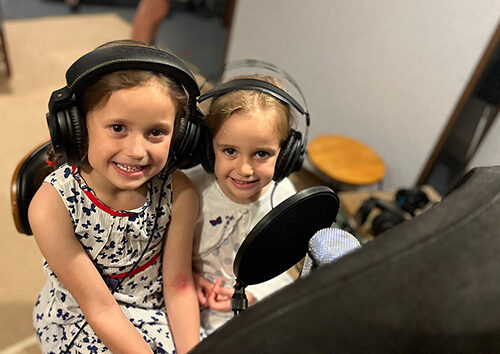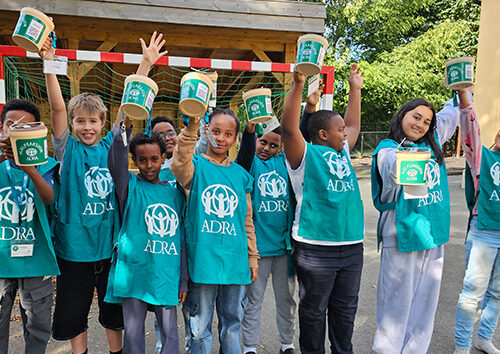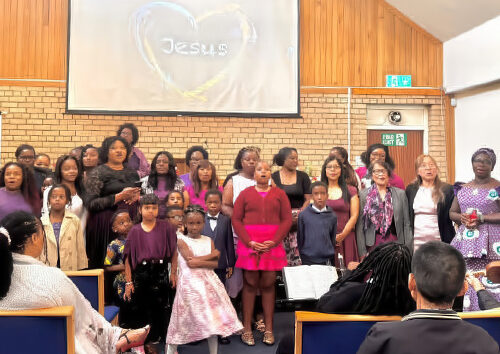The coronavirus outbreak has naturally triggered an enormous outpouring of anxiety. The escalating crisis is in the news every time we turn on the TV or tap on our phones. Life has suddenly turned upside down and the rules are being rewritten daily. Families are working, studying, caring for each other and trying to stay healthy in confined spaces, with limited resources, and often a long way from those they love. When we feel anxious, we’re more likely to be irritable with each other and that causes even more anxiety.
![[Photo credit: Conner Baker/Unsplash] conner baker - unsplash](https://ted.adventist.org/sitenews/wp-content/uploads/2020/03/images_news-2020_conner-baker-unsplash_1.jpg) The more children feel loved, safe, and happy, the less anxious they’ll be. Even in hard times, there are lots of things you can do in your own home to help your children and teenagers feel much less anxious.
The more children feel loved, safe, and happy, the less anxious they’ll be. Even in hard times, there are lots of things you can do in your own home to help your children and teenagers feel much less anxious.
One of the first things you can do as a parent is to manage your own anxiety around COVID-19. Find out the latest reliable information about staying safe and help everyone in your family to follow the advice. Limit the amount of time you spend reading, watching or listening to the anxiety-provoking news. Look for the heartwarming stories of kindness and generosity in this crisis and share these with your children.
Be a calm example
Tell your children what you do to calm yourself down when you begin to feel anxious, so they can learn some tips from you to help them manage their own fears. If you find yourself feeling overwhelmed, try some of the ideas in this article so that less of your distress spills onto your children. Find a quiet place to talk to the people who listen to your feelings, show that they care for you, and help you to feel calmer.
Notice what they’re feeling![[Photo credit: Steinar Engeland/Unsplash] steinar engeland - unsplash](https://ted.adventist.org/sitenews/wp-content/uploads/2020/03/images_news-2020_steinar-engeland-PQ-unsplash-scaled.jpg) Pay close attention to what your children are doing and saying and look out for any signs that they are worried about what is happening around them. Some children go quiet and sit alone in their room, others might become moody, some might behave more roughly with those around them, or play in ways that are destructive. Children and teenagers might not know how to start a conversation with you about how they’re feeling. It can help to spend time alone with them, doing something that they really enjoy, before opening up the conversation about their concerns.
Pay close attention to what your children are doing and saying and look out for any signs that they are worried about what is happening around them. Some children go quiet and sit alone in their room, others might become moody, some might behave more roughly with those around them, or play in ways that are destructive. Children and teenagers might not know how to start a conversation with you about how they’re feeling. It can help to spend time alone with them, doing something that they really enjoy, before opening up the conversation about their concerns.
Listen carefully
Listen warmly to your children’s fears and concerns. Stop what you’re doing, look into their eyes, and show that you care by hugging them or touching them warmly. Explain that it’s normal to feel worried when there are lots of scary things happening in the world, and the best thing to do is to talk about their fears so that you can care for each other and work things out together.
If your child finds it difficult to talk about their feelings, try drawing an outline of a head and asking them to write or draw on the shape what they’re thinking about. Or write out each worry on a separate piece of paper and think of practical things you can do together to manage each of their concerns. Try not to dismiss their fears, or put them down for being worried, because they might be less likely to talk to you about their feelings in the future.
Check in daily
A crisis like this will bring up all kinds of different emotions and challenges for each of us. Check in with each other every day by sharing your saddest moments together and comforting each other. Then share your happiest moments together and celebrate them in a fun way. Tell each other the most surprising thing you learned in the day, too. Or the most beautiful thing you saw or heard.
Remember when…![[Photo credit: Jordan Whitt/Unsplash] jordan whitt - unsplash](https://ted.adventist.org/sitenews/wp-content/uploads/2020/03/images_news-2020_jordan-whitt-unsplash1.jpg) Most children have experienced a time when they felt really anxious about something, but everything turned out fine in the end. Use these experiences to help them remember how well they coped with some of their worries in the past. “You were really worried about going into a new class at school last year. But you were really brave, and you managed so well. And by the end of your first day, you made friends with Billy and you had a load of fun! I wonder what will work out well this time?”
Most children have experienced a time when they felt really anxious about something, but everything turned out fine in the end. Use these experiences to help them remember how well they coped with some of their worries in the past. “You were really worried about going into a new class at school last year. But you were really brave, and you managed so well. And by the end of your first day, you made friends with Billy and you had a load of fun! I wonder what will work out well this time?”
Balanced honesty
When children ask us hard questions about what is happening in the pandemic, we need to answer them honestly and simply, without too much extra information. If we “lie” to them to help them feel better, and then they find out we have not told them the truth, it will make it harder for them to trust us in the future. “Yes, a lot of people are getting very sick and some of them are dying, but lots more people get better. Many people in the world are working really hard to find a solution, and lots of people, right here around us, are doing amazing things to take care of others.”
Break the anxiety cycle
When our negative thoughts and concerns take over our brain, they can make us feel even more worried and sad. Doing something that takes lots of concentration can break the anxiety cycle. Hobbies, construction kits, jigsaws, learning a new skill, cooking, reading, mind-puzzles, and art and craft projects can all help to distract children and teenagers from the spiral of anxious thoughts, especially when you do the activities together as a family.
Try gratitude![[Photo credit: Hannah Rodrigo/Unsplash] hannah rodrigo unsplash](https://ted.adventist.org/sitenews/wp-content/uploads/2020/03/images_news-2020_hannah-rodrigo-unsplash-scaled.jpg) Thankfulness can be a great antidote to anxiety. When we remember the positive things in our lives, and we feel grateful, we’re more likely to feel calmer and more joyful. Go through the alphabet as a family, listing all the things you’re thankful for beginning with each of the letters. Walk through your house and name ten things you’re thankful for in each of the rooms. Find a tray and ask everyone to put three things on the tray that represent what they’re most thankful for.
Thankfulness can be a great antidote to anxiety. When we remember the positive things in our lives, and we feel grateful, we’re more likely to feel calmer and more joyful. Go through the alphabet as a family, listing all the things you’re thankful for beginning with each of the letters. Walk through your house and name ten things you’re thankful for in each of the rooms. Find a tray and ask everyone to put three things on the tray that represent what they’re most thankful for.
Calming down
Help your child or teenager to make a list of things that help them to feel better when things are bothering them. Sipping cool water, or trying to blow the biggest bubbles possible, can help them breathe in naturally calming patterns. Hugs, laughing at jokes and funny video clips, gentle tickling, back rubs, warm bubble baths, playing games, baking bread, making a meal together, being creative, and focusing on the intricate details of nature, can all help them to feel better. Try to include some naturally quiet and calming moments in your everyday schedule at home.
Be kind Doing something kind for someone else helps us to feel better, too. When we’re compassionate and think of others, we’re naturally calmed as well. Check out the kindness activities you can do from home at the Trans-European Division (TED) website.
Doing something kind for someone else helps us to feel better, too. When we’re compassionate and think of others, we’re naturally calmed as well. Check out the kindness activities you can do from home at the Trans-European Division (TED) website.
Help your children to make colourful and encouraging posters to put in the windows of your home to give hope and joy to the people who walk down your street. Make cards to send to lonely relatives and create gifts together that you can give to others in the future.
Prayer and worship
In this time of anxiety and stress, look for the Bible verses that bring peace and comfort and focus on them. Learn them in fun ways and sing any songs you know that are based on these Bible verses. Act out the story of Jesus calming the storm and reflect on how He calms the storms in our world and in our hearts. Anxious children may need interactive prayers that they can see and experience. Draw around your hands and cut out the shape. Imagine this is the hand of God. Write your worries on the palm of the hand. Then remember that God cares about us very much, and we can leave all our worries in His hands.
At times of major crisis, like this COVID-19 pandemic, there are many things we hear and see in the news from around the world that can overwhelm us with a sense of helplessness and tragedy. It’s important to put these things in God’s hands too so that they do not overwhelm. This is where we can leave our prayers for all the suffering people, those who have lost loved ones, the medical staff and the scientists who are looking for cures, medicines and vaccines.
 If you are looking for creative worship ideas to do at home together, check out the family worship placemats which you can download and print on the TED website.
If you are looking for creative worship ideas to do at home together, check out the family worship placemats which you can download and print on the TED website.
These are challenging times. None of us has a clear road map about how this pandemic will be resolved in the end. We will have moments of anxiety as we face difficult challenges and decisions. Talking about our dilemmas together, comforting each other, and praying for each other will all help us to navigate this unknown territory. But we can be sure that God does have the map; He knows how this will work out; we know that He is lovingly longing to take us all away from this broken world forever. One day He will wipe away all our tears forever and calm all of our fears with His love.
For now, He is with us and our families through this crisis. He holds us all close to His heart. He cries when we cry, and He hurts when we hurt. He comforts us in all that we are facing so that we can comfort others and pass on His love. And He invites us to hand over all our anxieties to Him, because He cares so much for each of us.
(Revelation 21; 1 John 4:18; Isaiah 41:10; 2 Corinthians 1:3-4; 1 Peter 5:7)
Karen Holford has an MA in Educational and Developmental Psychology and an MSc in Family Therapy. She is the Family Ministries director of the Trans-European Division.
tedNEWS Staff: Victor Hulbert, editor; Deana Stojković, associate editor
119 St Peter’s Street, St Albans, Herts, AL1 3EY, England
E-mail: [email protected]
Website: www.ted.adventist.org
tedNEWS is an information bulletin issued by the communication department of the Seventh-day Adventist Church in the Trans-European Division. Readers are free to republish or share this article with appropriate credit including an active hyperlink to the original article.



